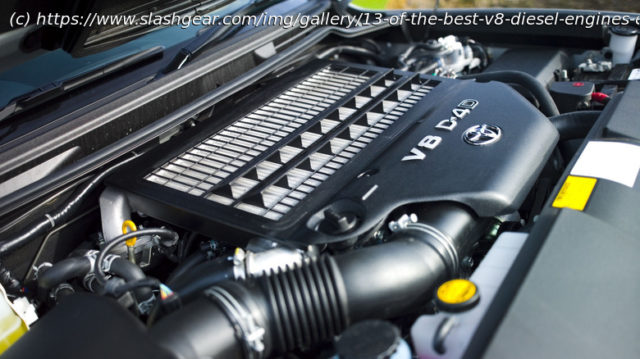From marine beasts to truck titans, here are 13 of the greatest V8 diesel engines ever built, celebrated for power, reliability, and innovation.
The V8 diesel engine didn’t have its greatest introduction, at least in the passenger car world. Developed for buyers seeking higher efficiency, Oldsmobile’s V8 diesel-powered Cutlass proved to be a complete lemon with probably the worst reliability record of any engine in history.
But don’t let that fool you into thinking the industry hasn’t produced great V8 diesel engines. In fact, the V8 diesel has been a staple in Scania’s truck range since 1969, providing class-leading power figures for decades. These engines are also widely used in marine applications, the defense industry, and power generation, among others. Of course, some of the best V8 diesel engines ever made were also installed in passenger cars, providing outstanding performance and excellent fuel economy.
This piece will serve as a showcase for all those great V8 diesel engines, regardless of application. What makes a great V8 diesel engine, you might ask? Well, anything that sets it apart from its rivals, like reliability, specific power and torque output, efficiency, and advanced technology. Let’s examine this closely!Toyota 1VD-FTV 4.5L V8
The 1VD-FTV is Toyota’s first and last V8 turbodiesel engine. But don’t let that « lack of expertise » fool you into thinking it’s a dud. This 4.5-liter behemoth is one of the best diesel engines Toyota ever built and a favorite among off-road enthusiasts globally, powering icons like the Land Cruiser 200 and 70 Series, and even the Lexus LX450d. It’s a modern diesel with four valves per cylinder, a common rail system with nine-hole fuel injection, and one or two turbochargers, depending on the version. However, Toyota ensured the engine is stout by installing a forged steel crankshaft and high-strength steel connecting rods.
To the dissatisfaction of enthusiasts, Toyota discontinued the 1VD-FTV last year, replacing it with a 2.8-liter four-cylinder turbodiesel. The new engine has very big shoes to fill, because the 1VD-FTV is one of the most reliable V8 turbodiesel engines ever made. That’s particularly true for the unstressed, single-turbo variant found in the Land Cruiser 70 Series, which produces 202 hp and 317 lb-ft of torque. With proper maintenance, it’ll probably never break, especially in versions with the upgraded vacuum pump produced after 2011. Sadly, you can’t buy the unbreakable Land Cruiser 70 Series in the U.S.
There’s also a twin-turbocharged variant, which is quite the powerhouse with 282 hp and a massive 479 lb-ft of torque. In the Land Cruiser 200, this translates into a 0-62 mph (0-100 km/h) sprint of 8.2 seconds and a top speed of 131 mph. Most impressively, the big SUV is rated at 23 mpg combined.Volkswagen/Audi 4.2L TDI V8
VW Group’s V8 turbodiesel, launched in 2005, isn’t as reliable as Toyota’s 1VD-FTV. Shocker, we know. But it’s still durable, with a much better reliability record than its 4.0-liter predecessor. It’s also much more powerful than its Toyota rival. Audi used it in the first-gen Q7, where it made 326 hp and a frankly ridiculous 561 lb-ft of torque, thanks to its twin-turbo configuration and common rail direct injection system. The big Q7 sprinted to 62 mph in 6.6 seconds with this engine and maxed out at 147 mph.
Fast forward a decade, and the numbers became even more impressive. The 2018 Audi A8 4.2 TDI V8, for instance, packed 379 hp and an even higher 627 lb-ft of torque, enough for a 0-60 sprint of just 4.5 seconds. Yup, that’s sports car performance in a large, diesel-powered luxury sedan. The most impressive figure is the 38 mpg fuel economy, which is astoundingly high for such a powerful engine.
After almost 15 years in service, the 4.2-liter V8 TDI was replaced by a more modern 4.0-liter unit. The new V8 TDI produced an astonishing 429 hp in the Audi SQ7 and truck-like 663 lb-ft of torque. Unfortunately, this engine was short-lived, so it didn’t have enough time to reach the greatness of its predecessor.BMW 3.9L M67D V8
Before the turn of the millennium, there was a turbodiesel war going on between German luxury automakers. Customers wanted more fuel-efficient cars but didn’t want to sacrifice performance, so BMW, Audi, and Mercedes-Benz were all working on V8 diesel engines. BMW beat them to the punch, introducing the brand-new M67D in 1998. The engine was made by combining the cylinder blocks from two M47 four-cylinder diesels and had a capacity of 3.9 liters. The M67D was a DOHC design with 32 valves, common rail direct injection, and two turbochargers.
As a result, it had a solid output of 235 hp, or 242 hp at 4,700 rpm in the facelifted 1999 740D. However, the torque was way more impressive at 413 lb-ft and available between 1,750 and 2,500 rpm. In other words, the M67D pulled pretty much everywhere in the rev range. The 0-60 mph sprint of 8 seconds and 150 mph top speed were also impressive for the time. Still, that was only the beginning; in 2006, BMW introduced the upgraded 4.4-liter M67TUD44, which produced a healthy 325 hp and 553 lb-ft of torque.
You’d be surprised to hear that the M67D is also a durable engine. Yes, it’s not among the five most reliable engines BMW has ever built, but it’s still free of huge problems. It’s hard to work on, though, and this is true for most German engines.Navistar/Ford 7.3L Power Stroke V8
Navistar is one of the most well-known manufacturers of trucks, buses, and diesel engines in the U.S. So, naturally, when Ford wanted a reliable yet powerful V8 turbodiesel for its F-Series Heavy Duty trucks, it contacted Navistar. The collaboration gave us the 7.3-liter Power Stroke V8, one of the best diesel engines ever built. The reason? It’s probably the most reliable American diesel engine.
See, the Navistar T444E came before the EPA put the hammer down on diesel engines. This engine didn’t need the unreliable Exhaust Gas Recirculation (EGR) system to meet emission standards and only relied on a catalytic converter.






